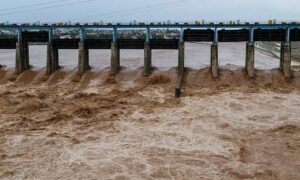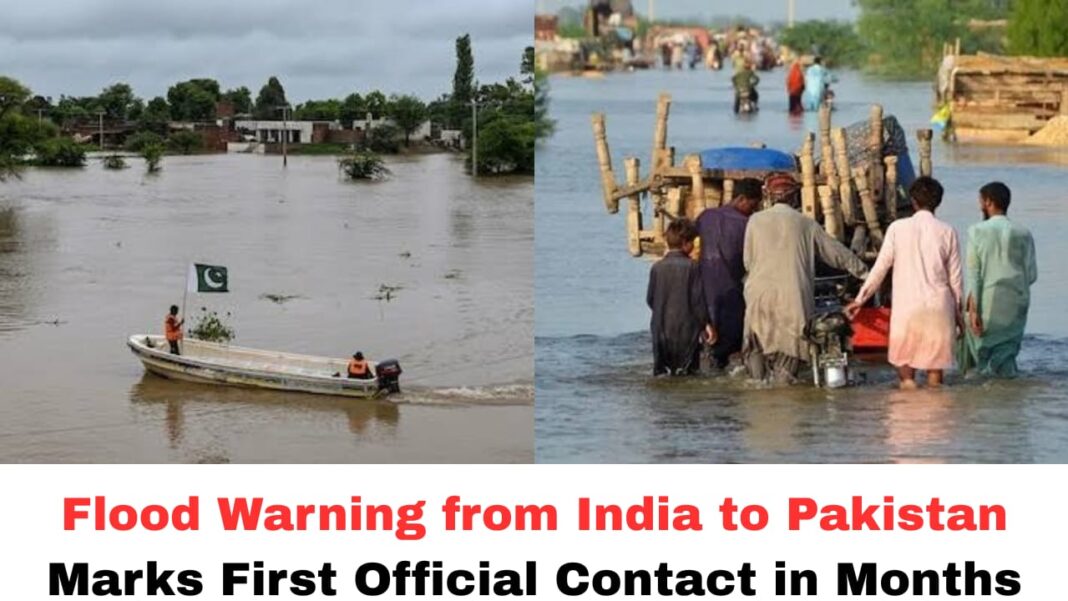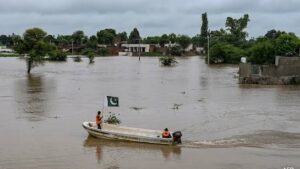Digital News Guru National Desk:
India’s Flood Warning to Pakistan Sparks First Diplomatic Contact in Months
In a stark display of humanitarian resolve amidst geopolitical tension, India on August 25, 2025, issued a formal flood warning to Pakistan — marking the first official or public contact between the two nuclear-armed neighbors in several months.
A Notice in Place of a Treaty
Traditionally, water-sharing disputes between India and Pakistan fall under the purview of the 1960 Indus Waters Treaty (IWT) and its implementing body, the Indus Waters Commission. But this time, New Delhi by-passed the formal treaty mechanism, alerting Islamabad through diplomatic channels instead — a gesture India described as purely “humanitarian”, not bound by the treaty.

This unconventional mode is all the more striking given that India had suspended the treaty earlier this year, in April, following a terrorist attack in Kashmir blamed on Pakistan. That suspension triggered a cascade of diplomatic standoffs, including missile exchanges in May — the most serious hostilities between the two nations in decades.
Monsoon Mayhem: A Deadly Backdrop
The warning came against the backdrop of relentless monsoon rains that have wrought havoc across South Asia. In Pakistan, nearly 800 lives have been lost since late June; in Indian-administered Jammu & Kashmir, at least 65 more have perished. Both sides continue to grapple with devastating floods and landslides.
Evacuation and Emergency Measures
Pakistan responded immediately. Authorities evacuated upward of 150,000 people from its Punjab heartland, particularly in villages alongside the Ravi, Sutlej, and Chenab rivers — regions critically dependent on stable river flows for agriculture and food security.
Focusing on key districts, life-saving efforts moved 14,000 people from Kasur and 89,000 from Bahawalnagar, thanks to early warning systems and ground coordination by the National Disaster Management Authority (NDMA).

Theory Meets Reality: Beyond Water, Signaling Change
This moment transcends its immediate purpose. On one level, it represented a rare breach in mounting distrust, showcasing that environmental emergencies can still override political enmity — a vital reminder that, sometimes, water brings dialogue, even when treaties fail.
Yet, there is mounting alarm in Islamabad and beyond. Pakistani officials termed India’s decision to bypass the treaty as a violation of international norms, warning it sets a dangerous precedent that could further destabilize regional peace. Critics noted that despite the humanitarian label, the choice to sidestep the IWT raises serious legal and diplomatic questions about treaty respect and diplomacy in crisis.
The Stakes: Water, Trust, and Climate Futures
Pakistan’s reliance on the Indus river system for irrigation and hydroelectric power makes timely and trusted flood warnings a matter of life and livelihood. The months-long suspension of treaty protocols has only increased the vulnerability of communities along the floodplains.
And climate change is intensifying the frequency and severity of these monsoon flashpoints. Rapid glacier melt, delayed cloudburst events, and shifting weather patterns are rewriting South Asia’s hydrological reality — demanding new forms of cooperation in the face of disaster.
What Comes Next?
- Reassessing the IWT’s Relevance
This incident could revive conversations on whether the Indus Waters Treaty’s mechanisms — conceived decades ago — are sufficiently agile for 21st-century climate crises. - Diplomacy via Crisis
India’s choice to engage Pakistan in this instance, even through a strained channel, opens the door for future crisis-led dialogue — potentially rebuilding frozen lines of communication. - Strengthening Bilateral Disaster Protocols
If climate-driven crises will continue to batter the region, formalizing emergency water-sharing protocols outside geopolitical disputes could save lives and build resilience. - Public Perception and Political Messaging
For Indian leadership, this overture offers a chance to frame the move as noble — yet there’s a risk: if Pakistan perceives it as strategic leverage rather than goodwill, the gesture could backfire.
Final Reflections
India’s flood warning to Pakistan is emblematic of a broader truth: Nature does not respect borders. And when landscapes flood and lives are under threat, old grievances can be overshadowed by a human impulse to protect.
Yet, this moment underscores both the power and fragility of trust. Diplomatic gestures born of crisis must be backed by long-term mechanisms and cooperation — especially in a climate-altered world. If India and Pakistan can use this opening to rebuild even limited channels, it may offer a blueprint for environmental diplomacy amidst enduring political conflicts.
You May Also Read: Indian Navy commissioning two advanced stealth frigates—INS Udaygiri and INS Himgiri









